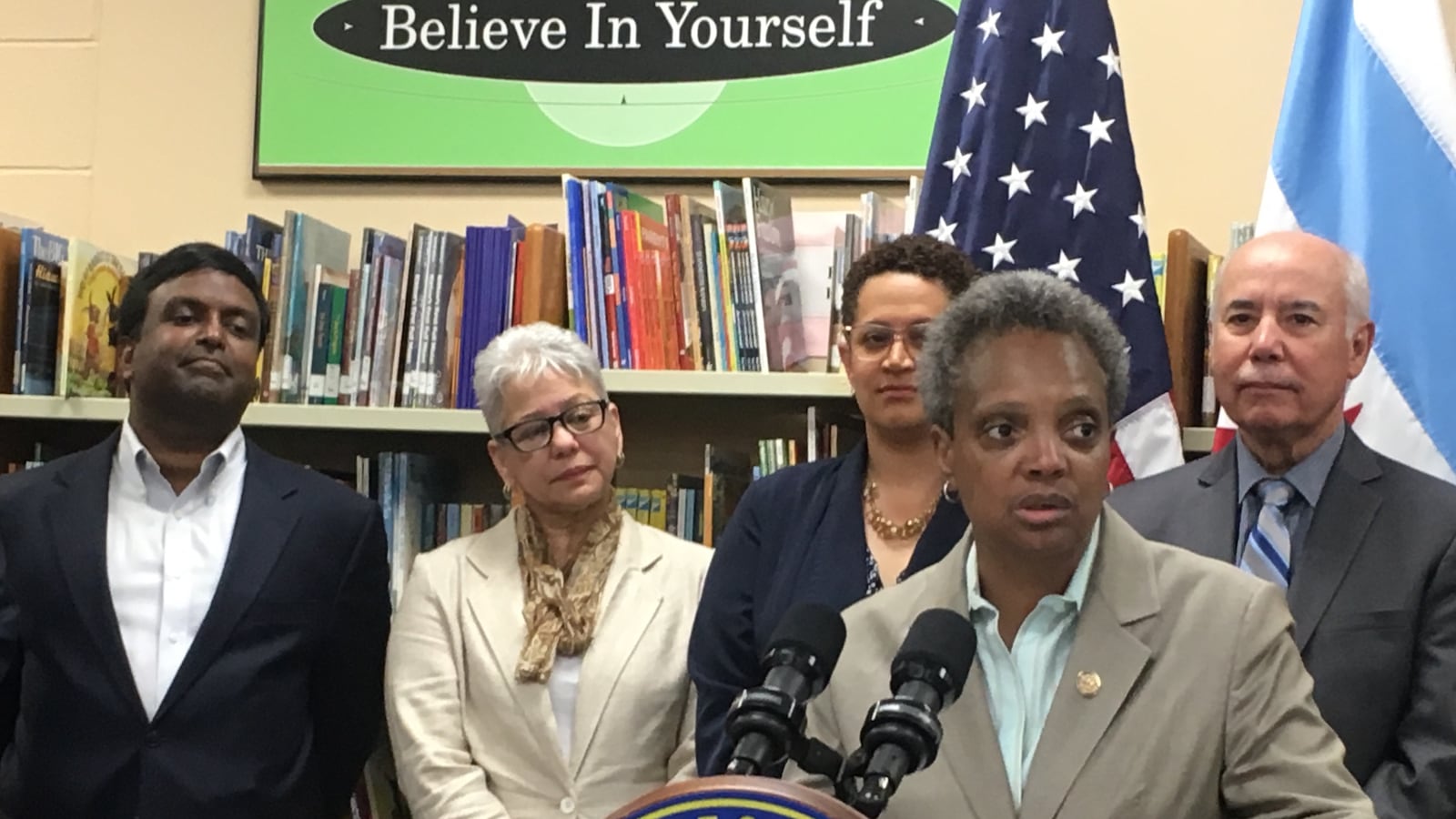Chicago Mayor Lori Lightfoot promised Monday to change how the Board of Education does business — starting with the board’s tendency to end monthly meetings with lengthy closed-door deliberations before voting on major decisions.
“The majority of the work that the school board does is going to have to be in the public,” Lightfoot said. “The days where everything was done in executive session, and then they come out and take a vote, that’s over.”
Related: Mayor Lori Lightfoot appoints parents, former grads, educators for new Chicago school board
Lightfoot’s declaration came Monday morning during a press conference at Hampton Fine and Performing Arts School in the Ashburn neighborhood on the far Southwest Side, where she unveiled her new appointed school board.
“I think every single one of the members here that we are proposing understand that transparency is the cornerstone of legitimacy,” Lightfoot added. “You can’t have legitimacy when you do everything in secret, and we’re not going to operate that way.”
Lightfoot announced a new seven-person school board on Monday that includes people with deep experience in Chicago schools, including former graduates, a principal, and parent and community advocates. Lightfoot said she targeted candidates with academic backgrounds and a broad array of experiences learning about, understanding, and challenging the school district.
Related: Meet Sybil Madison, Chicago’s new deputy mayor for education
New School Board President Miguel del Valle said Lightfoot “wants a board that is going to challenge a system that has a lot of great things happening, but can always do better,” and promised a shift of tone in the board’s stewardship of schools.
“I want vocal, active board members who will use their expertise to challenge the system,” Del Valle said. “It’s not going to be a rubber stamp, it’s not going to be [a board] that will wait for orders before casting a vote.”
School board Vice President Sendhil Revuluri said that the mayor, schools chief Janice Jackson, and del Valle would take the lead hashing out how to improve transparency at the board.
While decisions related to contract negotiations, personnel, and other sensitive issues will likely stay behind closed doors, Revuluri said the new board would have to figure a balance between transparency and ensuring that the board can efficiently provide governance and oversight of the district.
“It’s extremely important that we have transparency, that we can evaluate decisions that the district has to make, but that we do that in a way that promotes trust,” he said.
Related: Lori Lightfoot names four women of color to head education transition team
Lightfoot campaigned on a promise to support a switch from a school board appointed by the mayor to one chosen by the public. She said Monday that her appointments would serve as an interim step to an elected board, which requires a change to state law. She retains the power to appoint and remove school board members at will until then.
Chicago Teachers Union President Jesse Sharkey issued a statement Monday that decried recent layoffs and demanded that Lightfoot keep her promise of support for an elected board.
The union president said Lightfoot had a chance to pass a bill in the state legislature that would have created an elected board. “Yet she refused,” his statement said, “instead doing what [Mayor] Rahm Emanuel did for eight years: pushing Senate President Cullerton to derail that legislation while refusing to engage with the very grassroots forces that have been fighting for this most basic democratic right.”
Sharkey also called on Lightfoot’s newly appointed board to quickly tackle critical needs at Chicago schools, including more resources for bilingual education, more nurses, social workers and clinicians in every school, supports for students affected by trauma and poverty, and relief for overcrowded schools.
Lightfoot, who has called the legislation Sharkey references “unwieldy” for its large number of voting districts and board members, said she’s hearing from various stakeholders about ideas for structuring a new elected school board. She said she intends that process to yield a legislative proposal that “gives a real pathway for those parents who are on the [Local School Council], those parents of CPS students, to really have their seat at the table.” But in the interim, she said, “the [board’s] work needs to continue.”
Related: Pressure mounts on Lori Lightfoot to support elected school board bill
Lightfoot said she wants the board to apply a lens of equity and inclusion as it governs schools, with a focus on improving the quality of classroom experience for students across the city and ensuring that neighborhood schools get enough resources to create better opportunities for young people.
When asked about his priorities on the board, Del Valle said one of his biggest concerns is “taking steps to strengthen neighborhood schools while continuing to support the work of our selective enrollment schools, and existing charter schools.” He said more state funding would go a long way toward that goal, and acknowledged that Chicago’s per-pupil approach to funding district schools creates a resource challenge for schools losing enrollment.
He also said he’d like for the city to expand early childhood education programs, improve special education, and lower the chronic truancy rate by better engaging parents and providing students with more wraparound services to address issues outside school that might pose barriers to good attendance.
As schools chief Janice Jackson said in her remarks Monday, the new board has a lot of work to do.
“Chicago Public Schools is a district on the rise, it’s no secret that CPS stands out as a positive model throughout the country, but we will not be satisfied until every single child at Chicago Public Schools has an equal opportunity and an equal shot,” she said. “And we’re not there yet.”

